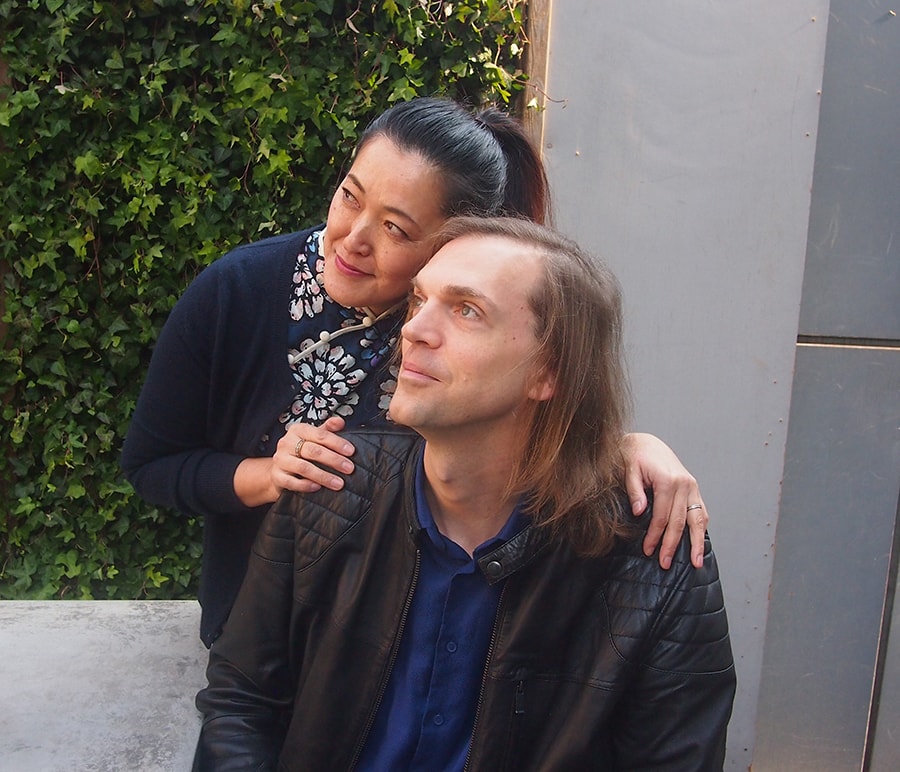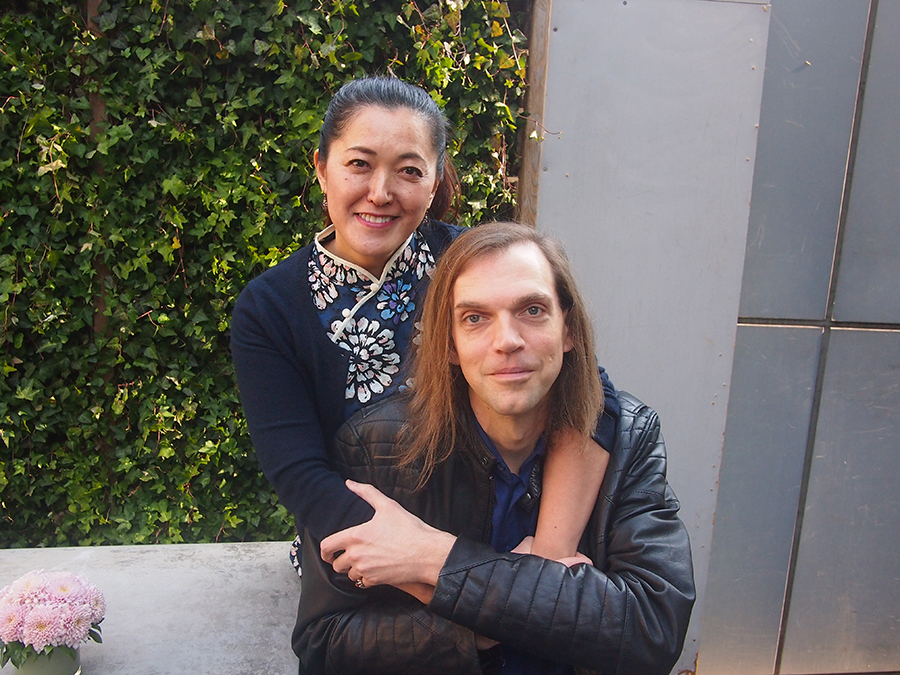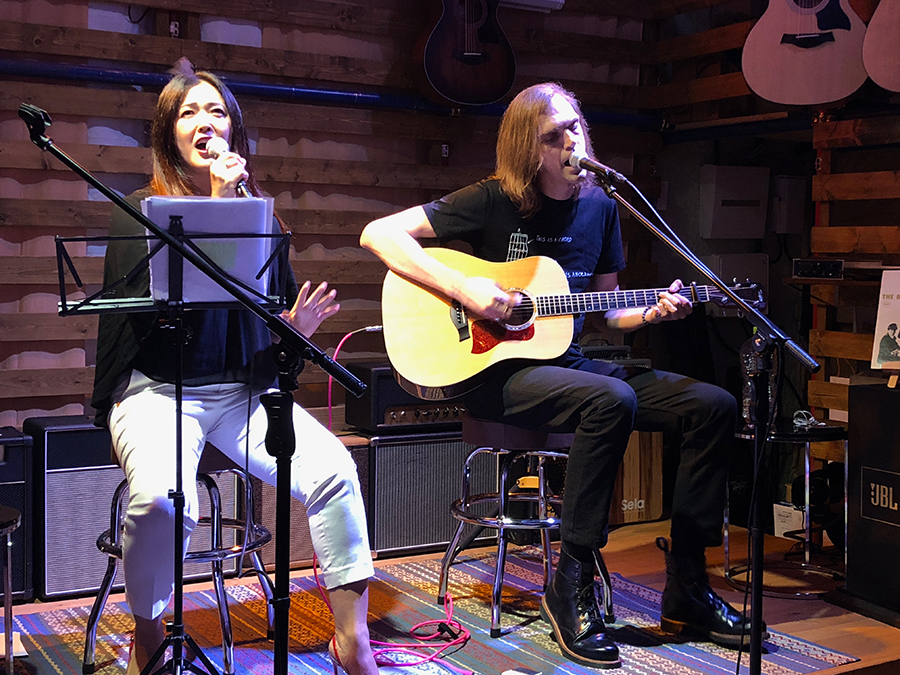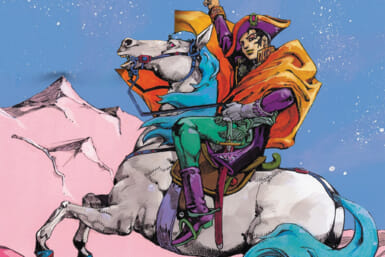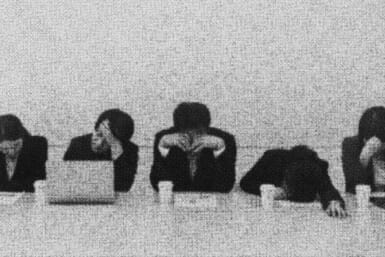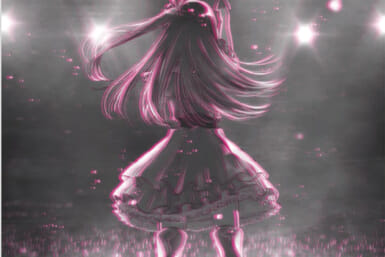This year is shaping up to be a big one for the folk duo nature airliner. Coming off of their full length album, Cardinal, which was released last year, they’ve just released a single, “Letting Go.” But the biggest event coming up for them is that they’ll be performing at Liverpool Sound City, a festival in the UK, in May. In general, though, they’re a group that seems to catch good luck wherever they turn, whether it’s getting endorsements from Taylor Guitars or catching airplay around the world. We caught up with Laurier Tiernan (guitar, vocals, and songwriting) and Eiko Tiernan (vocals) to ask them about what it was like to record an album at a historic studio and how being positively aggressive can yield big results.
The last time we talked, you were a little ways away from recording at a pretty storied location. What was the recording experience like, and what was the name of the studio again?
Laurier: The former Columbia Studio A in Nashville, and it was the historic studio where people like Johnny Cash recorded “Ring of Fire,” Leonard Cohen recorded his second and third albums – Songs from a Room and Songs of Love and Hate – and Bob Dylan. Bob Dylan also recorded “Like a Rolling Stone” there. So there’s a host of classic, timeless albums that were recorded there. And it was shut down some decades ago when Columbia decided not to use it any more, and it was used as an office space for a bit, and then Belmont University in Nashville bought the space, because they had some kind of network with some wealthy donors that were very heavily involved in Music Row. The whole area where that studio is is called Music Row, and it’s very historic for different studios. So Belmont University bought that space and tried to return it to its original state. And they couldn’t do it exactly, but they’ve done their best to look for gear from the time period that people still had, amongst which was a mike collection from the 50s and 60s, and Eiko got to choose from three vintage mikes, and when she chose the one she liked, when she tried out all three…
Eiko: It had been used by Johnny Cash. That was interesting.
What was the experience like recording there?
Laurier: It was fantastic. It was a dream come true, because I’d been dreaming of that space since I was 10 years old and heard Leonard Cohen’s Songs from a Room, and I never thought I’d get to record in that space and the experience of just living in Nashville for a week, and getting up in your hotel room every morning and going to the studio and recording all day and then coming back to your hotel and then repeating the process was a dream come true.
Eiko: Laurier has got a strange talent. He doesn’t think “It might be impossible.” He just runs to the object like a dog.
One of the things that I wanted to ask was – there are lots of bands in Tokyo, there are lots of people trying to do music and record albums, and it just seems that you have quite incredible luck or very interesting opportunities come up. Even the Taylor Guitars endorsement. How did that come about?
I’ll rewind to 2012. For a lot of my career I was playing a really cheap Korean no name acoustic guitar that my mom had bought me when I was a teenager, because I liked the sound. I just lucked out on the wood; somehow it sounded awesome. And it was stolen – I forgot it on a train. And when I looked for a replacement, the best ones I felt, to my ears, were Taylors. And ever since I got that, I’d dreamed of having an endorsement. And then in 2012, Eiko and I covered the Tokyo Guitar Show, and when we were there, we met the artist’s relations person for Taylor Guitars and I begged him for an endorsement. And he said, “We’ll think about it.” And three years after that – I kept on asking him, come on come on come on. And he’d say, we’ll think about it. We’ll monitor your career, and we’ll think about it. And three years ago, around the same time as my birthday, I decided to really pitch hard, and say we’ve done this and this and we’ve done that and please. And he said, if our Tokyo branch says it’s OK, we’ll do it. And I contacted the Tokyo branch, and they said if California says it’s OK we’ll do it. And I said no no no, they said if you said … and they said, OK, if you can compromise on the guitar you ask for – because I had asked for a $6,000 guitar – you can come down today and we’ll sign you up. So I ran down to the shop and they gave me a guitar.
So it was just asking and being persistent and charmingly pushy, I suppose, yeah?
Laurier: It’s a big key in the industry to be, as you said, charmingly pushy. You have to be consistent, but you have to be polite and not too annoying. It’s a balance.
Eiko: You used to be annoying. But I carefully monitor that part. So if I see he’s going too far, I just tell him.
Laurier: She just reels me in, like a fish.
Eiko: Wait a little bit; wait until next Tuesday. I usually control his nuisance [laughs].
So tell me some more of the things you’ve been doing with your solo career during the time since we’ve talked.
Laurier: I’ve basically just been working at writing and planning the recording of a series of EPs.
Eiko: He often says he totally gave up his solo career. He kept saying that after we formed nature airliner. But because he’s a songwriter, that’s what we are. So without his solo career, nature airliner doesn’t exist. And I also believe him in his poetry writing potential as well. Even just the lyrics, his art could exist. Even without music, his writing is really good. So I truly believe in his potential as a poet, like Leonard Cohen. So I always encourage him, and say, why don’t you do a solo career? But he used to be a solo career punk rock musician. But he doesn’t have to be a punk rock musician any more, but just go back to guitar and your voice.
You’ve got a new single that’s just come out. Can you tell us more about it?
It’s the last song we recorded in Nashville. We were given a week to record and we wrapped the album in about three and a half days. And we were satisfied with what we had, and so I had actually hoped in my wildest dreams to record an album and an EP. And it might have been overshooting, but we had one song that I felt was possibly the best song I’d ever written. Like the closest thing that I’ve written to a classic like “Autumn Leaves.” And it’s much darker than anything else on the album. Really slow, really ponderous, really dark. And it’s kind of an anti-suicide song. I wouldn’t say it’s an anti-suicide song as much as a song in favor of not giving up. It’s called “Letting Go.” And as I said, it was the last song we recorded in Nashville, and I had it in my mind when we left Nashville that we should release the album first without it and then later, some time in the winter, release this song as a follow up single. But I did some research in the past few months about how apparently, most suicides do not happen at Christmas time like many people think, they actually mostly happen in the spring. And I thought, “OK,” so we’ll actually release this song in the spring. And we’re working on a music video right now with artists from around the world who have been suicidal and who have overcome it. So they’re each getting a vignette in the video, and the end of the video will give a passport photo video shot with a bit of their history and their overcoming of their struggle and what they’ve gone on to do. Like one person had a really bad childhood, ended up homeless, and overcame his suicidal depression to become a presenter on Channel 4 in the UK.
What’s the story behind it?
That’s a long story, but I’ll give you a really abridged version. I was recurrently suicidal from 13 to 26, partially because I discovered that I was queer when I hit puberty. I discovered that I was bisexual. I thought I was gay at the time. I actually told the school counselor that I was gay. And she said, “that’s not accepted in society.” And I thought, “Fuck!” And I was Catholic and the Catholic Church says that all queers are going to hell, and I’m like “Fuck!” And then I found out I had Marfan syndrome the next year, and that I had impending death before the age of 40. So I was recurrently suicidal for 13 years and I finally somehow overcame it. I think it was by going to music school. I finally decided in my late 20s, I’m going to music college and I’m going to invest in my career. And somehow it alleviated. I won’t say I didn’t get depressed any more, but I was no longer suicidal. But in the winter of 2015, when my first TV series was canceled, I hit suicidal tendencies for the first time in 23 years. It was the first time I was involved in a regular TV series, and I thought this was my big break, and so I kind of lost it. And set about writing songs for the first time in a while. And two songs came out – one was a love song to Eiko that we put on the album, and the other was “Letting Go.” And “Letting Go” was a bit of an epiphany about depression and about the sense that at least for me, I realized that one possible key to overcoming suicidal tendencies is to not live in the past and not live in the future but … often people get depressed when they think they can try and fix the past or worry too much about the future. We get depressed when we behave that way. But if we let go of at least a bit of that control and live more in the now, in what we can act upon, then I think we have a better chance of overcoming suicidal tendencies and depression in general. And that’s why I wrote that song.
It’s funny, I started this song just writing lyrics. “I’ve come too far to turn back now, I’m come too far to just give up.” And those were the first lyrics I wrote down on paper, and I just knew it had to be a song. And I think it took me about three weeks. Sometimes songs come in a few minutes, sometimes songs come in a few years, like for Leonard Cohen. But for me it took about three weeks for the whole thing to jell.
For “Letting Go,” I originally thought we were going to sing in unison, or harmonies, and we tried many ways to work the vocals. And finally it was me in Nashville, saying “It doesn’t sound good, it’s not working, just sing lead, and I’ll do some haunting backing vocals occasionally, and the engineer said “hey, hey, yeah, that’s what you should do.” And that’s what that became. I want to record a version of my own and release it – just one guitar and my vocal. But that’s going to come in a few months. I was going to record it for my first solo acoustic EP that I’m going to release soon, but it’ll have to be for later on.
What does it mean to you that you’ll be playing your first UK festival in May?
It’s a breakthrough. I’ve been told that the UK market is very hard to break into recently, and for good reason, there are innumerable amazing artists in such a relatively small space. So, I see it as a massive triumph for our career that we’ll be playing the same festival Ed Sheeran played when he was just crossing over into international fame seven years ago.
What do you hope to share with new potential fans in the UK?
More than sharing something with the fans, we’re just hoping to find more people that can connect with what we do, and since Liverpool Sound City is an international music-industry conference, this will be one of the best places to meet those people.
Do you have any plans to do any more touring around the UK or Europe while you’re over there?
Yes, but no dates are confirmed yet. We’ve been communicating with a number of booking agents, artists, venues, and industry people of all stripes, trying to figure out what would be best to do with this tour. We’re hoping to at least hit London, Edinburgh and Dublin or Belfast on this trip. Again, we’re looking for the ideal situations, to bring what we do to the maximum number of people who want to hear us.
Is there anything you want potential listeners to know about nature airliner?
Recently, one of our fans from Australia said she’d like to hear us on the radio in her city, but in the city where she lives, most the radio plays EDM and hip hop. And instead of being discouraged by that, a light went on in my head and I thought it’s completely timely for us to be doing what we’re doing, which is so staunchly rooted in simplistic folk from the late 60s and early 70s, because although the mainstream is mostly focused on hip hop and EDM, because of that, there must be a percentage of the population that is yearning for an alternative, and when they want something less boisterous – I mean, I love EDM myself – but when people are craving something less boisterous and more relaxing and more healing and more tranquil and more spiritual, we’re here. You can check us out almost anywhere that has digital music, and you can come see us in concert. You can request us to come to your city or country. We’re here to heal.

